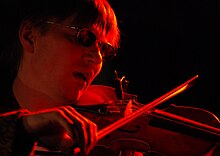Félix Lajkó
Félix Lajkó (born December 17, 1974 in Bačka Topola (Hungarian: Topolya) in Vojvodina , Yugoslavia ) is a Hungarian - Serbian musician and composer .
Life
Félix Lajkó grew up in a family of ethnic Hungarians in the Serbian province of Vojvodina. His first musical instrument was the zither , which he began to play when he was ten. He won several major awards in this category in Yugoslavia and Hungary . He started playing the violin at the age of twelve . He completed the six-year primary school in Mali Iđoš in three years. After he was excluded from the secondary arts school in Subotica at the age of 16 , he went to Budapest , where he performed with the Dresch Quartet , the pianist and composer György Szabados and the Ensemble Ritual Nova by Boris Kovac . Since then Lajkó has lived alternately in Budapest and Subotica. Concert tours have taken him to countless appearances in Hungary and Serbia a. a. to the Czech Republic, Germany, France, Great Britain, Japan, Italy, Monaco, Romania and Slovakia. A tour through Serbia with Boban Marković's brass music orchestra during the NATO air raids in 1999 was an expression of his not only musical maladjustment and ties to his homeland .
Lajkó composes and arranges his own music; He has worked successfully with many internationally known musicians, such as Min Tanaka (Japan), Noir Désir (France), Alexander Bălănescu (Great Britain) or Magdolna Rúzsa (Hungary), combining many different musical styles into original new creations. He wrote the music for a number of Hungarian and Yugoslav films and plays. The Hungarian director Miklós Jancsó made a film about Lajkó in 1999.
music
Félix Lajkó's music is considered difficult to describe. It is based on a virtuoso and energetic mastery of the instrument, first of all the violin, next to the zither. Because of its intense, ecstatic variety, it is characterized as "burning". It is characterized by the pronounced tendency to improvise, without the pieces lacking a clear structure. In his music, influences from traditional folk music from Hungary and Serbia, from Roma music , from klezmer , jazz , blues , rock and classical music combine to create an unmistakable style.
Movie
In the Hungarian feature film Delta (2008) by Kornél Mundruczó , he plays the male lead alongside Orsolya Tóth . The film won several prizes, including the Prize of the Fédération Internationale de la Presse Cinématographique at the Cannes International Film Festival , the Don Quijote Prize of the Féderation Internationale des Ciné-Clubs at the Cottbus Film Festival , the Golden Film Role and the Prize for Best Music (by Félix Lajkó) of the Hungarian Film Week (all 2008).
Discography
Solo with your own ensemble
- Most jöttem ... , 2016 (CD, Fonó Budai Zeneház)
- Mező , 2013 (CD, Fonó Budai Zeneház)
- A bokorból , 2009 (CD, Tilos az Á produkció)
- Remény , 2007 (CD, Tilos az Á produkció)
- Lajkó Félix 7 , 2004 (CD, Tilos az Á produkció)
- Félix , 2002 (CD, Tilos az Á produkció)
- Lajkó Félix és bandája játszik , 2001 (CD, Tilos az Á produkció)
- Lajkó Félix és zenekara: Koncert '98 , 1998 (CD / MC, Fonó Records)
- Lajkó Félix és zenekara , 1997 (CD / MC, Fonó Records)
- Lajkó Félix és bandája , 1995 (CD, self-published)
Collaboration with other artists
- Boban Markovics Orkestar Feat. Lajkó Félix , 2000 (CD, X Produkció)
- Lajkó Félix - Lõrinszky Attila: Live at the Academy , 1997 (CD, Fonó Records)
- SaMaBa Trió: Opus Magnum , 1996 (CD, Fonó Records, guest musician)
- Dresch Dudás Mihály: Zeng a lélek , 1993 (CD, Fonó Records)
- Noir Desir: 666.667 Club , 1992 (CD, Polygram / Universal, guest musician)
Web links
- Félix Lajkó in the Internet Movie Database (English)
- Félix Lajkó Official Website (English and Hungarian)
- Lajko Felix Fan Club of Japan (English and Japanese)
- PassiOn Music: Balkan Music Page CDs by Félix Lajkó (English)
| personal data | |
|---|---|
| SURNAME | Lajkó, Félix |
| BRIEF DESCRIPTION | Hungarian-Serbian musician and composer |
| DATE OF BIRTH | 17th December 1974 |
| PLACE OF BIRTH | Backa Topola |
